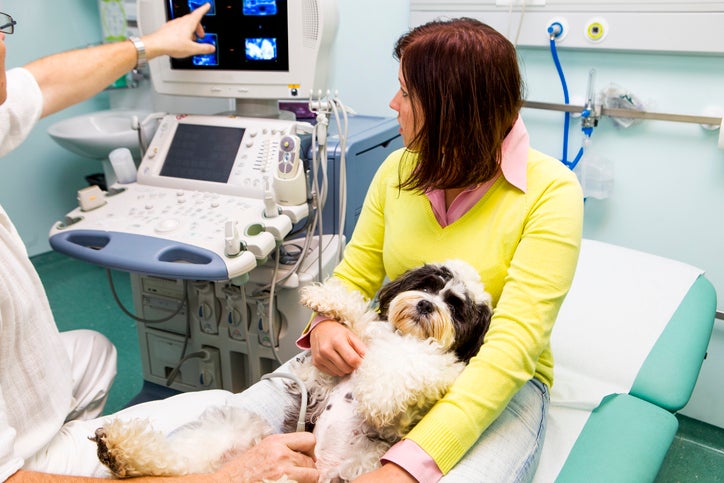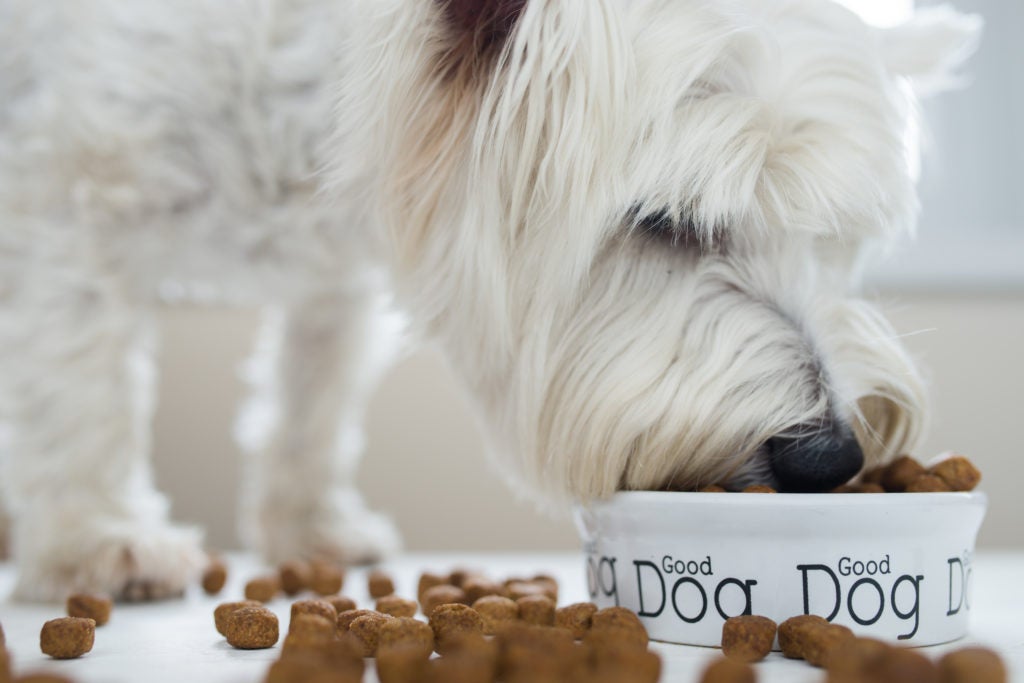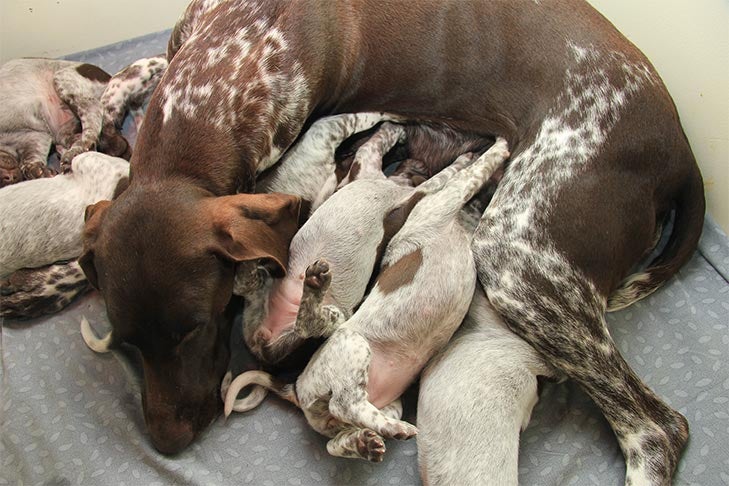
Everything a pregnant mother puts into her body has the potential to affect the development of her fetus. This applies to humans as well as our dogs. Remember to review her water, food, nutritional supplements as well as drugs.
The only things that should go into a brood bitch before her breeding and during her pregnancy and lactation should be nutrients and medications that will help keep her healthy and grow her puppies.
1. Water
Water is a frequently overlooked, important, and essential nutrient – our dogs will take in more water than food in her lifetime. Annual testing of the water in your kennel, home, and well is recommended. Water samples should be taken from multiple sources for testing – hoses, hose bibs, and faucets in the home and kennel, and the well. Your local county or county extension agent can help you with testing. Ask for coliforms and nitrates testing.
2. Food
Food – remember you are feeding her for a successful pregnancy from the time she takes her first meal. Yet we are seeing a huge number of our breeding clients follow fads and trends when selecting food for their breeding dogs. She needs to successfully take in adequate quality and quantity of colostrum. Without enough colostrum, her chances of surviving to make it out of the whelping box are minimal. Her mother needs to provide adequate milk for her until weaning. Then she needs to be put on a weaning diet that will allow her to grow to her full potential for size and strength without overfeeding. Too much nutrition is as bad as not enough – dogs that are over-conditioned are at risk of developing orthopedic conditions such as hip dysplasia.
Once she is approaching time to breed, she should be on a diet that will support her activity level, keep her at an appropriate weight, and allow her to have the nutrition she needs to have a robust heat cycle and good uterine health.

We recommend only feeding a commercially available kibble dog food from one of the only three dog food manufacturers that do research and feeding trials on their foods – Purina, Royal Canin/Iams, and Hills. These foods have cooked proteins and an assortment of carbohydrates including rice, barley, oats, corn, and wheat. Dogs need carbohydrates to grow puppies and to make milk. There are concerns that the pea, lentil, and potato-based diets contain phytoestrogens and other components that may interfere with fertility. There are also reports from the FDA that these products are linked to taurine deficient cardiomyopathies – a serious heart condition in the dog. So breeding dog or not, we do not recommend grain-free diets.
Change as quickly as possible to a diet that contains wheat, corn, rice, oatmeal, barley, and beet pulp. These carbohydrate sources have been used in dog kibble for over 50 years successfully feeding our dogs. More research will help us understand the correlation reported by the FDA July 12, 2018.
- Raw diets – in a word, don’t feed raw food. Feed kibble. Raw diets are frequently poorly balanced, and put you, your family, your puppy buyers and your dogs and puppies at risk of developing serious parasitic and bacterial infections. In addition, studies at WhelpwiseR have shown bitches fed raw meat diets have a higher than normal incidence of dystocia, the inability to deliver pups effectively. The imbalance of calcium and phosphorus are thought to be the cause of dystocia.
- Pregnancy diet – Royal Canin HT42d is the only pregnancy diet on the market. It is manufactured in a large and small breed diet and is only available on their website, not in retail stores. HT42d contains micronutrients shown to improve bloody show, behavioral changes of estrus, uterine preparation for pregnancy, embryo, placental formation and pregnancy maintenance. The diet is designed to be fed from the start of her heat cycle to day 42 of pregnancy (the origin of the name HT = heat and 42 = days). After day 42, a puppy diet is recommended.
- Puppy and performance diets – puppy food is the preferred diet to feed moms during the last 3 weeks of pregnancy through weaning. Avoid large breed puppy foods as they are too restricted in calcium. Feed her approximately 25-50 % more food during the last 3 weeks of pregnancy and 2 to 4 times her regular ration during lactation, based on her breed, size of her litter and activity needs to maintain good body condition.
3. Nutritional Supplements:
- Folic acid = vitamin B9. It has been shown to reduce midline defects in many species including humans and dogs. Midline defects are most commonly seen as cleft palates but can also include open abdominal walls and spina bifida. There is no published dose for the dog, but it is estimated to be between 400 mcg and 1 mg per dog per day until day 40 of the pregnancy. For maximal effect, it should be started at least one month prior to breeding. Breeds at greatest risk are the brachycephalic breeds. Research has shown cleft palate incidence can be reduced in half with appropriate supplementation. Excess supplementation will not cause harm. However, excesses of liver and vitamin A in the diet can cause an increased incidence of cleft palates. Check your supplements and rations for imbalances if there is a high incidence of midline defects in your breeding program.
- DHA = smarter puppies. DHA or docosahexaenoic acid has been shown to improve brain function in puppies, babies, and adults. DHA can be added as a nutritional supplement, as a single component or in skin and coat supplements. For maximal effect, this should be fed to the pregnant bitch as well as being added to puppy rations. Supplementing is especially important in bitches who have had multiple litters as her levels will deplete with each passing pregnancy. Research shows that it takes 8 months for a bitch to achieve her pre-pregnancy nutritional state after a litter. Some puppy food and most human baby formula have DHA added. There is also a suggestion that DHA can reduce the risks of age-related dementia in dogs and humans.
- Calcium supplementation is essential but needs to be managed precisely. The uterus requires calcium for oxytocin to create efficient and effective contractions, to deliver the pups and placentas. However, too much is as bad as too little. Supplementation should not start until three days prior to the due date. Supplementing too early can tell the bitch’s pituitary gland to stop mobilizing calcium from her bones. This in turn will lead to inadequate levels of active Calcium in her circulation and milk.

All sizes of moms need calcium for effective uterine contractions. However, primarily small breed bitches with large litters are at risk of developing eclampsia. Eclampsia is the dog equivalent of cows with milk fever. Cows develop muscle weakness with calcium deficiencies and dogs have the opposite syndrome – they develop tense muscles that progress to tetany, almost like seizures with elevated temperatures. Treatment requires veterinary intervention with IV calcium, which can be dangerous if not done with appropriate timing and monitoring. It is much smarter and safer to prevent eclampsia by adequately supplementing with a calcium and vitamin D product. Human products such as Tums are ineffective. Plan ahead and have calcium supplements available – prevent so you don’t have to treat.
4. Drugs and Vaccines
Drugs and Vaccines should be strictly limited prior to a bitch’s heat cycle and throughout her pregnancy and lactation. Remember some of the medications you are giving her for heartworm, flea and tick prevention and control can last for extended periods in her body. These can be potentially dangerous to her puppies by causing birth defects. Carefully read labels and drug package inserts to assure you are administering medications that have been tested and proven safe during pregnancy and lactation. Drugs should also be assessed as safe prior to administration for male dogs in a breeding program. Drugs that must be avoided and are not safe for males or females include corticosteroids such as prednisone and other steroids in topical ear, eye, and skin treatments. Only one oral flea and tick medication (BravectoR) is classified as safe in breeding dogs, male and female.
No vaccines including Rabies should be administered to a female dog during the heat cycle on which you plan to breed her or during her pregnancy.
If you have any questions or doubts about the safety of a diet or drug use in your breeding stock, be sure to discuss this with your veterinarian prior to administration.
About the author: Marty Greer, DVM, JD has run the Veterinary Village Small Animal Clinic in Wisconsin since 1982. She is an expert in canine reproduction, is the author of Canine Reproduction and neonatology, and is a frequent lecturer on the subject. Dr. Greer also studied law at Marquette University, is a partner in Animal Legal Resources, LLC, and is a board member of the National Animal Interest Alliance, is the Director of Veterinary Services for Revival Animal Health and President of Society of Veterinary Medical Ethics.

